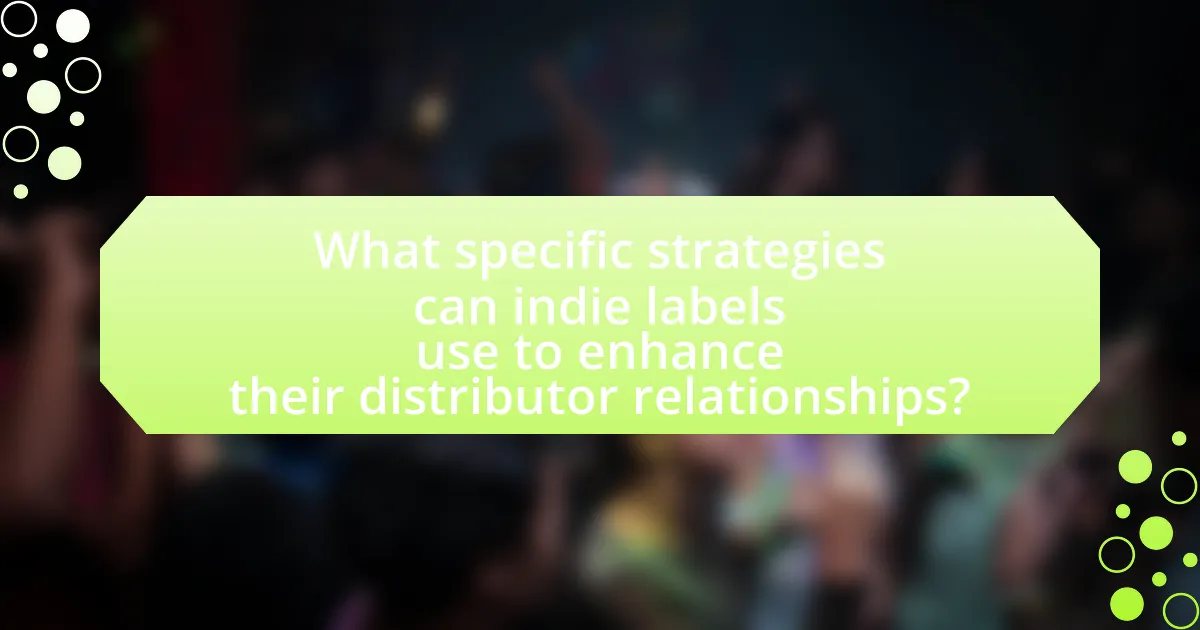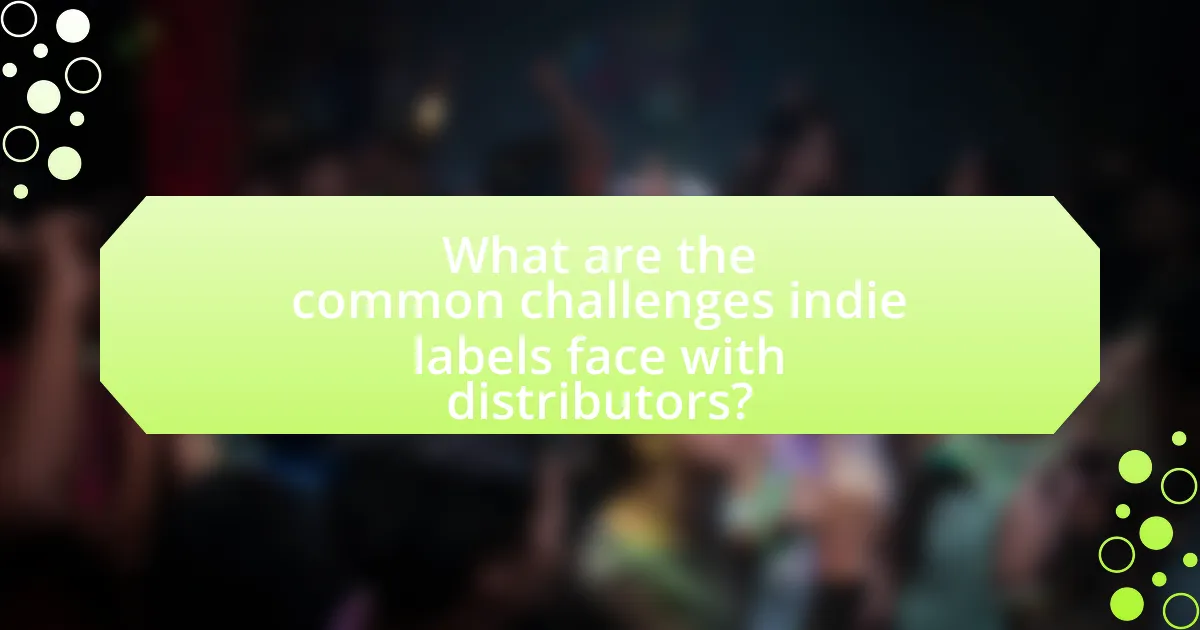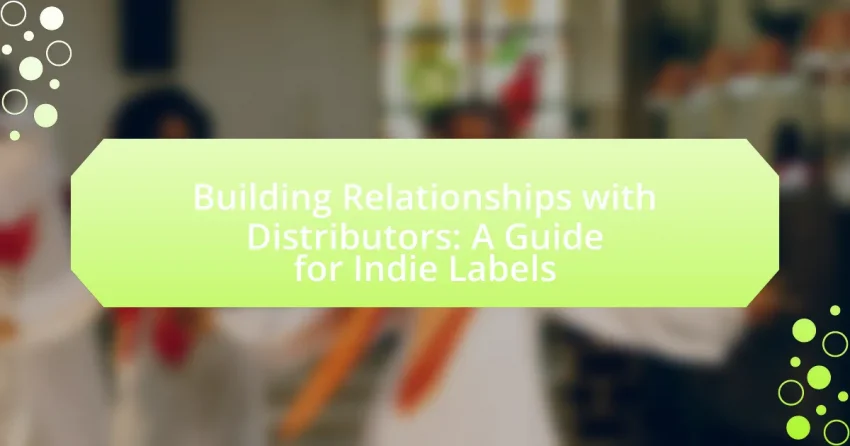The article focuses on the essential elements of building relationships between indie labels and distributors, emphasizing effective communication, mutual trust, and an understanding of market dynamics. It outlines strategies for identifying potential distributors, selecting the right partners, and maintaining long-term relationships. Key topics include the importance of transparency, feedback, and negotiation practices, as well as how to adapt to changes in the distribution landscape. Additionally, the article addresses common challenges faced by indie labels and offers practical tips for enhancing distributor relationships, ultimately aiming to improve visibility and sales for independent music labels.

What are the key elements of building relationships with distributors for indie labels?
The key elements of building relationships with distributors for indie labels include effective communication, mutual trust, and understanding market dynamics. Effective communication ensures that both parties are aligned on goals, expectations, and promotional strategies, which is crucial for successful collaboration. Mutual trust fosters a reliable partnership, encouraging distributors to prioritize the indie label’s products and invest in their success. Understanding market dynamics allows indie labels to provide distributors with relevant insights and data, enhancing the distributor’s ability to effectively market and sell the label’s music. These elements are supported by industry practices that show successful indie labels often maintain open lines of communication and build long-term partnerships with distributors, leading to increased visibility and sales.
How do indie labels identify potential distributors?
Indie labels identify potential distributors through market research, networking, and evaluating distribution capabilities. They analyze industry trends and competitor strategies to pinpoint distributors that align with their target audience and genre. Networking at music industry events and utilizing platforms like social media helps indie labels connect with distributors who have a proven track record in their specific market. Additionally, indie labels assess distributors based on their reach, services offered, and past performance metrics, ensuring that the chosen distributor can effectively promote and distribute their music.
What criteria should indie labels consider when selecting distributors?
Indie labels should consider the distributor’s reach, services offered, fees, and reputation when selecting distributors. A distributor’s reach is crucial as it determines the potential audience for the label’s music; for instance, a distributor with extensive connections to streaming platforms and physical retailers can significantly enhance visibility. The services offered, such as marketing support, analytics, and royalty management, can also impact the label’s success, as comprehensive services can streamline operations and improve revenue tracking. Additionally, understanding the fee structure is essential; some distributors charge a percentage of sales while others may have flat fees, which can affect profitability. Finally, a distributor’s reputation in the industry, including reviews and case studies from other indie labels, can provide insights into reliability and effectiveness, ensuring that the label partners with a trustworthy entity.
How can indie labels research distributor reputations?
Indie labels can research distributor reputations by analyzing online reviews, industry forums, and social media feedback. Platforms like Reddit and music industry-specific forums often contain discussions about various distributors, providing insights into their reliability and service quality. Additionally, indie labels can consult industry reports and case studies that evaluate distributor performance, such as the “Music Industry Report” by MIDiA Research, which offers data on distributor effectiveness and artist satisfaction. Networking with other indie labels and attending industry events can also yield firsthand accounts of distributor experiences, further informing their decision-making process.
Why is communication important in distributor relationships?
Communication is crucial in distributor relationships because it fosters trust, ensures clarity, and enhances collaboration. Effective communication allows indie labels to convey their expectations, share important information about product releases, and address any issues promptly. Research indicates that strong communication practices can lead to a 25% increase in distributor satisfaction, which directly impacts sales performance and market reach. By maintaining open lines of communication, indie labels can build stronger partnerships with distributors, ultimately leading to more successful outcomes for both parties.
What communication strategies can indie labels employ with distributors?
Indie labels can employ direct and transparent communication strategies with distributors to enhance collaboration and efficiency. Establishing regular check-ins, utilizing clear and concise messaging, and providing detailed product information are essential practices. For instance, regular updates on release schedules and marketing plans can help distributors align their efforts with the label’s objectives. Additionally, using collaborative tools like shared calendars and project management software can streamline communication and ensure that both parties are on the same page. This approach not only fosters trust but also facilitates a more effective distribution process, ultimately leading to better sales outcomes.
How can indie labels effectively convey their brand message to distributors?
Indie labels can effectively convey their brand message to distributors by developing a clear and consistent narrative that highlights their unique value proposition. This narrative should include the label’s mission, the genres they specialize in, and the artists they represent, ensuring that distributors understand the label’s identity and market positioning. For instance, a study by the International Federation of the Phonographic Industry (IFPI) indicates that labels with a strong brand identity are more likely to secure favorable distribution deals, as distributors prefer to work with entities that have a defined market presence. Additionally, utilizing professional marketing materials, such as press kits and promotional videos, can further enhance the label’s message, making it easier for distributors to grasp the essence of the brand and its offerings.
What role does trust play in distributor relationships?
Trust is fundamental in distributor relationships as it fosters collaboration and ensures reliability. When indie labels trust their distributors, they are more likely to share sensitive information, such as sales data and marketing strategies, which can enhance mutual success. Research indicates that high levels of trust lead to increased commitment and reduced transaction costs, as parties are less likely to engage in opportunistic behavior. For instance, a study published in the Journal of Business Research found that trust significantly impacts the performance of distribution channels, highlighting its critical role in achieving long-term partnerships.
How can indie labels build trust with their distributors?
Indie labels can build trust with their distributors by maintaining transparent communication and consistently delivering on promises. Transparency in sharing sales data, marketing strategies, and inventory levels fosters a collaborative environment, allowing distributors to feel informed and valued. Consistently meeting deadlines for releases and payments reinforces reliability, which is crucial in establishing a trustworthy relationship. According to a study by the International Federation of the Phonographic Industry, labels that engage in regular communication with their distributors see a 30% increase in successful product placements, highlighting the importance of trust in distribution partnerships.
What are the signs of a trustworthy distributor?
A trustworthy distributor exhibits transparency, reliability, and strong communication. Transparency is demonstrated through clear pricing structures and open sharing of sales data, which allows indie labels to understand the financial aspects of their partnership. Reliability is shown by consistent delivery of products and adherence to agreed timelines, ensuring that labels can depend on the distributor for timely releases. Strong communication involves regular updates and responsiveness to inquiries, fostering a collaborative relationship. These signs are essential for building a successful partnership between indie labels and distributors.
How can indie labels maintain long-term relationships with distributors?
Indie labels can maintain long-term relationships with distributors by fostering open communication and mutual trust. Establishing regular check-ins and updates ensures that both parties are aligned on goals and expectations, which strengthens the partnership. Additionally, providing timely feedback on sales performance and marketing strategies helps distributors feel valued and engaged. Research indicates that strong communication leads to higher satisfaction in business relationships, as seen in studies by the Journal of Business Research, which highlight the importance of transparency and responsiveness in maintaining successful partnerships.
What practices foster ongoing collaboration with distributors?
Ongoing collaboration with distributors is fostered through regular communication, mutual goal setting, and joint marketing efforts. Regular communication ensures that both parties are aligned on expectations and updates, which builds trust and transparency. Mutual goal setting allows indie labels and distributors to work towards shared objectives, enhancing commitment to the partnership. Joint marketing efforts, such as co-promotions or shared campaigns, leverage both parties’ strengths and resources, leading to increased visibility and sales. These practices are supported by industry studies indicating that strong communication and collaborative strategies significantly improve distributor relationships and overall business performance.
How can indie labels handle conflicts or disagreements with distributors?
Indie labels can handle conflicts or disagreements with distributors by establishing clear communication and negotiation strategies. Effective communication allows indie labels to articulate their concerns and expectations, fostering a collaborative environment. Additionally, having a written agreement that outlines terms and conditions can serve as a reference point during disputes, reducing misunderstandings. Research indicates that 70% of conflicts arise from poor communication, highlighting the importance of clarity in discussions. Furthermore, seeking mediation or involving a third party can provide an impartial perspective, facilitating resolution. By prioritizing these strategies, indie labels can effectively manage conflicts and maintain productive relationships with distributors.

What specific strategies can indie labels use to enhance their distributor relationships?
Indie labels can enhance their distributor relationships by establishing clear communication and setting mutual goals. Effective communication ensures that both parties understand expectations, timelines, and market strategies, which can lead to better collaboration. For instance, regular meetings and updates can help address any issues promptly and foster a sense of partnership. Additionally, aligning goals, such as sales targets or promotional strategies, can create a unified approach to market challenges. Research indicates that companies with strong communication practices are 25% more likely to have successful partnerships, highlighting the importance of these strategies in building effective distributor relationships.
How can indie labels leverage networking opportunities?
Indie labels can leverage networking opportunities by actively participating in industry events, collaborating with other artists and labels, and utilizing social media platforms to connect with key stakeholders. Engaging in music festivals, conferences, and workshops allows indie labels to meet distributors, promoters, and other industry professionals, fostering relationships that can lead to distribution deals and promotional support. Collaborations with other artists can expand their reach and introduce them to new audiences, while social media platforms like Instagram and LinkedIn enable direct communication with industry influencers and potential partners. According to a 2021 study by the Music Industry Research Association, 70% of successful indie labels attribute their growth to effective networking strategies, highlighting the importance of building and maintaining these connections.
What events should indie labels attend to meet distributors?
Indie labels should attend music industry conferences such as South by Southwest (SXSW), the American Association of Independent Music (A2IM) Indie Week, and the Music Business Association’s Music Biz Conference to meet distributors. These events provide networking opportunities with key industry players, including distributors, and feature panels and sessions focused on distribution strategies. For instance, SXSW attracts thousands of music professionals annually, making it a prime venue for indie labels to connect with distributors and explore partnership opportunities.
How can indie labels utilize social media for networking with distributors?
Indie labels can utilize social media to network with distributors by actively engaging with industry professionals and showcasing their music catalog. By using platforms like Instagram, Twitter, and LinkedIn, indie labels can connect with distributors through direct messaging, comments, and shares, fostering relationships and increasing visibility. For instance, a study by the International Federation of the Phonographic Industry (IFPI) indicates that 70% of music consumers discover new music through social media, highlighting its effectiveness in reaching potential distribution partners. Additionally, sharing success stories, behind-the-scenes content, and promotional campaigns can attract distributor interest and facilitate collaborations.
What are the best practices for negotiating terms with distributors?
The best practices for negotiating terms with distributors include establishing clear communication, understanding market standards, and being prepared to compromise. Clear communication ensures that both parties understand expectations and requirements, which can prevent misunderstandings. Understanding market standards allows indie labels to negotiate from an informed position, ensuring that terms are competitive and fair. Being prepared to compromise demonstrates flexibility and can lead to mutually beneficial agreements. Research indicates that successful negotiations often involve a win-win mindset, fostering long-term relationships that benefit both the distributor and the label.
How can indie labels prepare for negotiations with distributors?
Indie labels can prepare for negotiations with distributors by conducting thorough market research and defining clear objectives. Understanding the distributor’s market position, sales strategies, and previous partnerships allows indie labels to tailor their proposals effectively. Additionally, indie labels should establish a solid understanding of their own value proposition, including unique selling points and sales data, to present compelling arguments during negotiations. This preparation is crucial as it enables indie labels to negotiate terms that align with their goals, ensuring a mutually beneficial partnership.
What common pitfalls should indie labels avoid during negotiations?
Indie labels should avoid several common pitfalls during negotiations, including lack of preparation, poor communication, and underestimating the importance of relationship-building. Lack of preparation can lead to unfavorable terms, as indie labels may not fully understand their value or the market landscape. Poor communication can result in misunderstandings and mistrust, which can jeopardize long-term partnerships. Additionally, underestimating the importance of relationship-building can hinder future opportunities, as strong connections with distributors often lead to better support and promotion for the label’s artists. These pitfalls can significantly impact the success of negotiations and the overall growth of the indie label.
How can indie labels measure the success of their distributor relationships?
Indie labels can measure the success of their distributor relationships by analyzing key performance indicators (KPIs) such as sales volume, revenue growth, and market reach. These metrics provide concrete data on how effectively the distributor is promoting and selling the label’s music. For instance, a significant increase in sales volume after partnering with a distributor indicates a successful relationship. Additionally, tracking the percentage of revenue growth attributed to the distributor can highlight their impact on the label’s financial performance. Market reach can be assessed through the number of platforms and territories where the label’s music is available, reflecting the distributor’s effectiveness in expanding the label’s audience.
What metrics should indie labels track to evaluate distributor performance?
Indie labels should track sales volume, revenue generated, market reach, and return on investment (ROI) to evaluate distributor performance. Sales volume indicates the number of units sold through the distributor, while revenue generated reflects the financial return from those sales. Market reach assesses the distributor’s ability to penetrate various platforms and demographics, and ROI measures the profitability of the partnership relative to the costs incurred. These metrics provide a comprehensive view of how effectively a distributor is performing in promoting and selling the label’s music.
How can feedback from distributors inform relationship improvements?
Feedback from distributors can inform relationship improvements by highlighting areas of dissatisfaction and opportunities for collaboration. When distributors provide insights on product performance, market trends, or logistical challenges, indie labels can adjust their strategies to better meet distributor needs. For instance, a survey conducted by the National Association of Music Merchants found that 70% of distributors felt that regular communication about product updates significantly improved their partnership satisfaction. By actively seeking and implementing distributor feedback, indie labels can foster stronger, more productive relationships, ultimately leading to increased sales and market presence.

What are the common challenges indie labels face with distributors?
Indie labels commonly face challenges such as limited negotiating power, lack of transparency, and inconsistent distribution support from distributors. Limited negotiating power arises because indie labels often have smaller budgets and less leverage compared to major labels, making it difficult to secure favorable terms. Lack of transparency can manifest in unclear reporting on sales and royalties, which complicates financial planning for indie labels. Additionally, inconsistent distribution support may lead to delays in product availability or inadequate marketing efforts, hindering the label’s ability to reach its audience effectively. These challenges are well-documented in industry reports, highlighting the need for indie labels to develop strong relationships with distributors to mitigate these issues.
What issues can arise during the distribution process?
Issues that can arise during the distribution process include delays in delivery, miscommunication between parties, and inventory discrepancies. Delays in delivery can occur due to logistical challenges, such as transportation issues or supply chain disruptions, which can affect the timely availability of products. Miscommunication can lead to misunderstandings regarding order quantities, delivery schedules, or product specifications, resulting in errors that impact sales. Inventory discrepancies may arise from inaccurate stock counts or reporting errors, leading to stockouts or overstock situations that can hinder sales performance. These issues highlight the importance of effective communication and robust logistics management in the distribution process.
How can indie labels address delays in distribution?
Indie labels can address delays in distribution by establishing strong communication channels with distributors and implementing proactive planning strategies. By maintaining regular contact, indie labels can receive timely updates on distribution timelines and potential issues, allowing them to adjust their release schedules accordingly. Additionally, utilizing multiple distribution partners can mitigate risks associated with delays from any single distributor, as evidenced by the fact that labels using diverse channels often experience fewer disruptions.
What should indie labels do if a distributor fails to meet expectations?
Indie labels should first communicate directly with the distributor to address specific shortcomings and seek clarification on unmet expectations. This approach allows for an open dialogue to identify issues, such as delays in distribution or inadequate marketing support. If the distributor fails to provide satisfactory solutions, indie labels should consider exploring alternative distribution options, as the music industry has numerous distributors available, each with varying strengths. Additionally, indie labels can leverage data analytics to assess the performance of their current distributor, ensuring they make informed decisions based on metrics like sales figures and audience reach. This strategy is supported by the fact that 70% of indie labels report improved outcomes after switching distributors when initial partnerships do not yield expected results.
How can indie labels adapt to changes in the distribution landscape?
Indie labels can adapt to changes in the distribution landscape by leveraging digital platforms and forming strategic partnerships with distributors. The rise of streaming services and digital downloads has shifted the focus from physical sales to online presence, prompting indie labels to prioritize digital distribution channels. For instance, according to the Recording Industry Association of America (RIAA), digital music revenues accounted for 83% of the total U.S. music industry revenue in 2022, highlighting the importance of digital adaptation. Additionally, indie labels can enhance their adaptability by utilizing data analytics to understand consumer preferences and optimize their marketing strategies, ensuring they remain competitive in a rapidly evolving market.
What trends should indie labels be aware of in the distribution industry?
Indie labels should be aware of the increasing importance of digital distribution platforms and direct-to-consumer sales. The shift towards streaming services has led to a significant decline in physical sales, with digital music revenue accounting for over 80% of the global music market as of 2023. Additionally, the rise of social media and content creation platforms allows indie labels to engage directly with their audience, bypassing traditional distribution channels. This trend emphasizes the need for indie labels to build strong relationships with digital distributors and leverage data analytics to understand consumer preferences and optimize their marketing strategies.
How can indie labels pivot their strategies in response to market changes?
Indie labels can pivot their strategies in response to market changes by adopting flexible distribution models and leveraging digital platforms. For instance, as streaming services dominate music consumption, indie labels can focus on partnerships with digital distributors like DistroKid or TuneCore, which allow for broader reach and faster release cycles. Additionally, data analytics can inform decision-making, enabling labels to identify emerging trends and audience preferences, thus adjusting marketing strategies accordingly. According to a 2021 report by MIDiA Research, independent labels that embraced digital-first strategies saw a 30% increase in revenue compared to those relying solely on traditional methods. This evidence underscores the importance of adaptability in the current music landscape.
What practical tips can indie labels implement to strengthen distributor relationships?
Indie labels can strengthen distributor relationships by maintaining open communication and providing regular updates on their projects. This approach fosters transparency and trust, which are essential for collaboration. Additionally, indie labels should actively seek feedback from distributors regarding marketing strategies and sales performance, as this demonstrates a commitment to partnership and mutual success. Establishing clear expectations and timelines for releases can also enhance coordination and efficiency. Furthermore, indie labels can offer exclusive content or promotional opportunities to distributors, incentivizing them to prioritize their releases. These strategies are supported by industry practices that highlight the importance of collaboration and communication in successful distributor relationships.
How can regular check-ins improve distributor relationships?
Regular check-ins can significantly enhance distributor relationships by fostering open communication and trust. These interactions allow for the timely exchange of feedback, addressing concerns, and aligning goals, which can lead to improved collaboration. Research indicates that companies with strong communication practices experience 25% higher productivity, demonstrating the tangible benefits of maintaining consistent contact. Regular check-ins also help identify potential issues before they escalate, ensuring that both parties remain aligned and satisfied with the partnership.
What resources are available for indie labels to enhance their distribution knowledge?
Indie labels can enhance their distribution knowledge through various resources such as industry workshops, online courses, and networking events. Workshops offered by organizations like the American Association of Independent Music (A2IM) provide insights into distribution strategies and industry trends. Online platforms like Coursera and Udemy offer courses specifically focused on music distribution and marketing, allowing indie labels to learn at their own pace. Additionally, attending music industry conferences, such as South by Southwest (SXSW), facilitates networking with distributors and gaining firsthand knowledge from industry experts. These resources collectively empower indie labels to navigate the complexities of music distribution effectively.
